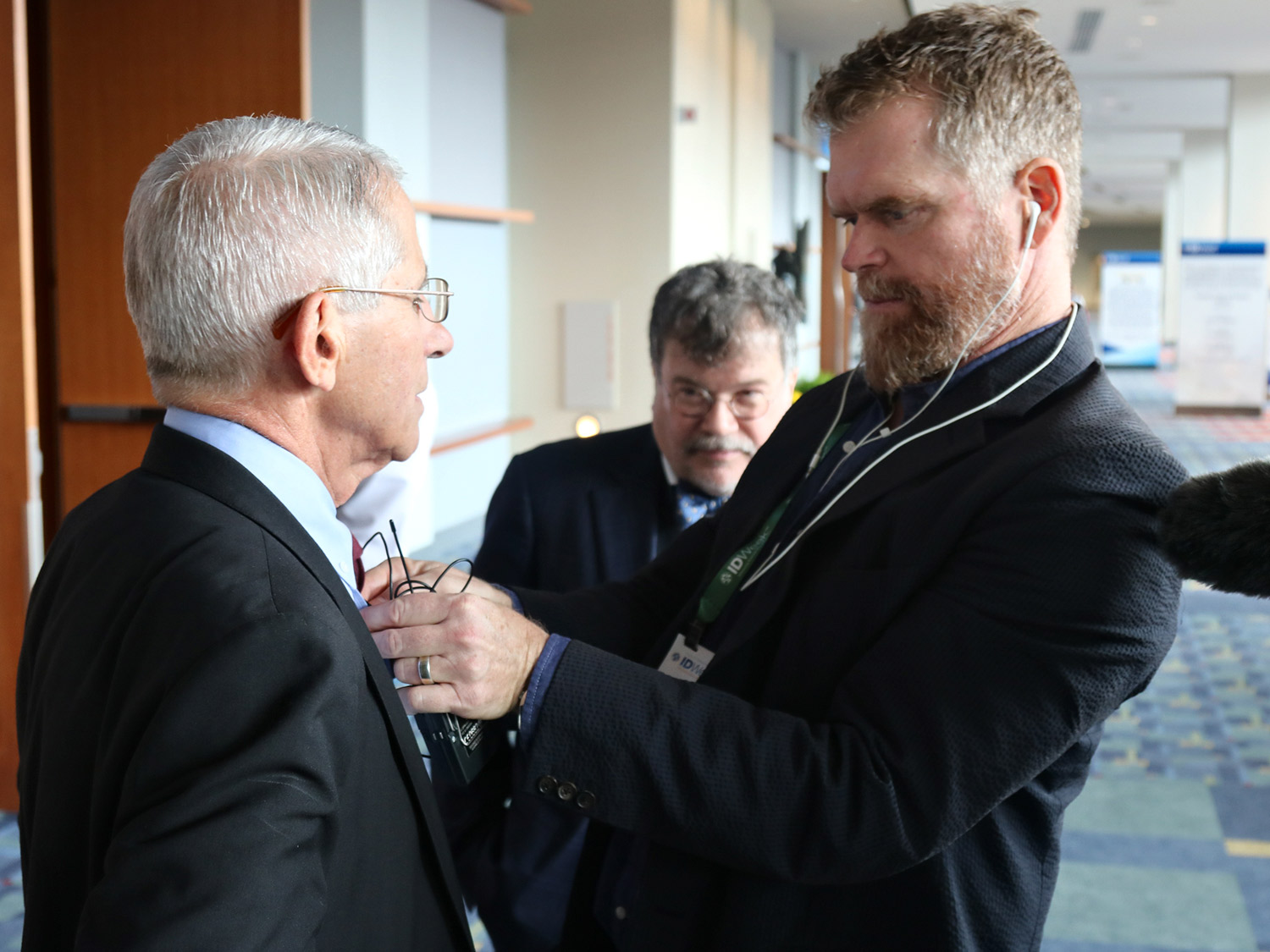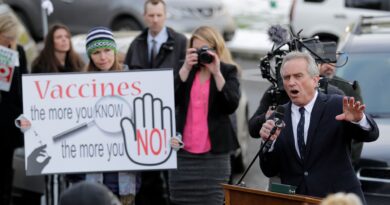A Filmmaker Takes on the Anti-Vaxxers

In a new documentary, Scott Hamilton Kennedy, here adjusting a mic on Dr. Anthony Fauci, attempts to debunk some of the fears of vaccination that have taken hold in this country.
Scott Hamilton Kennedy, who grew up summering in Wainscott at one of the Georgica Association’s most prominent oceanfront houses, Kilkare, has spent much of his filmmaking career in California examining various “roads to hell” created by good intentions.
His last film, “Food Evolution,” looked at the science behind genetically modified organisms and how an ingrained and deserved mistrust of corporations like Monsanto, which created toxic agents such as DDT and Agent Orange, could be clouding judgment on G.M.O. development and its potential to mitigate world starvation.
Neil deGrasse Tyson, who has become synonymous with scientific inquiry through his prominent public awareness campaign for fact-based reasoning and choices, served as narrator. The 2017 film looks at examples from places like Hawaii and Uganda, and around the mainland United States, where farms are being saved by successfully growing things like papayas and bananas from disease-resistant seeds after blights had wiped out previous strains.
Mr. Kennedy interviewed experts, advocates and activists, and the doubting public to get at the root of their suspicions about what harm G.M.O.s might cause and offer a competing narrative of their good. It was not without controversy.
Similarly, his latest effort, “Shot in the Arm,” which will open Friday in New York City, looks at the fear and uncertainty surrounding vaccinations.
Although it might be surmised that the film is a reaction to the reception of Covid-19 shots in this country (and around the world in certain demographics), Mr. Kennedy actually started his investigation for the documentary in early 2019, a response to the re-emergence of measles, and outbreaks in California, New York, and American Samoa.
Months before they became household names during the Covid crisis, he was interviewing doctors such as Anthony Fauci, Paul A. Offit, and Peter Hotez about the reluctance among parents to have their children receive M.M.R. (measles, mumps, and rubella) vaccinations, despite multiple large and well-regarded studies that demonstrated that it did not cause autism.
He also interviewed parents of children they describe as “vaccine injured,” who started exhibiting signs of autism a few months after receiving the M.M.R. vaccination. Robert F. Kennedy Jr. sits down for a one-on-one interview, and other anti-vax activists such as Andrew Wakefield and Del Bigtree are followed at public appearances.
Dr. Wakefield was responsible for a 1998 study of 12 patients that concluded there could be a connection between the shots and autism. It has since been retracted. A second study he conducted in 2002 was also considered by medical authorities to be flawed in its methods. Yet these studies are still cited today by those in the anti-vax community.
The film examines evidence that the return of measles, which was considered eradicated in the United States in 2000, was the result of the misuse of these studies to scare people into not only rejecting those vaccines, but any vaccines at all.
In the mix is one such concerned mother, Blima Marcus, who became a vaccine skeptic based on a book she was given by her chiropractor. Deciding later to pursue a doctorate program for her nursing degree, she was “knee-deep in research studies all the time.” She learned how to analyze them to see if they were conducted properly and ethically, and if there were conflicts of interest. “I started realizing what good research is about, what good science is about,” and changed her opinions.
A practicing Orthodox Jew, a group demonstrating a high degree of vaccine skepticism, she noted that some Orthodox communities have been regularly targeted by unsolicited propaganda against vaccines. A closed Hasidic community in Brooklyn was a site of one of the measles outbreaks in 2019. Ms. Marcus has gained notice for her efforts to help eradicate health misinformation that has been prevalent and unchallenged in these communities and has led to unnecessary disease.
While all this is central to the story of “Shot in the Arm,” the onslaught of Covid-19 and the path to where we are now is a dual focus, part of the same whole. The Covid pandemic was a time when we learned as a society that people weren’t just retreating from the idea of public good for their own notions of personal freedom and safety, they were getting violent about it.
Indeed, the inclusion of footage of the riots at the Capitol on Jan. 6, 2021, seems gratuitous until it is revealed that an anti-vax rally was going on nearby at the same time. This was also when Covid vaccines were just becoming available to health care workers and those extremely vulnerable to the virus. The just-as-fervid anti-vax demonstration shows that shots were no longer just about freedom of choice, they were political.
The patients who barely survived the disease, and the families of those who didn’t, have served as witnesses to what can happen without the protection provided by vaccines. Yet, some 20 percent of the population still have never received a single dose of the coronavirus vaccine, according to the Centers for Disease Control.
Joining those on the left, with their suspicions of autism, heavy metals, mercury, and other unproven claims about what is in vaccines, are the ultra-right, who blended the Covid shots into their feelings about masking and other restrictions brought on by the pandemic. Those stances have become intractable as conspiracy theories have gained favor and many decide to “do their own research” and find “their own facts,” often through social media and a very narrow lens.
This article has been archived for your research. The original version from The East Hampton Star can be found here.


